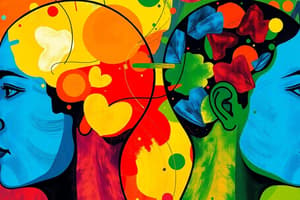Podcast
Questions and Answers
What is the primary focus of differential psychology?
What is the primary focus of differential psychology?
- To identify average behaviors in groups
- To understand memory processes in the brain
- To study how individuals differ in thoughts, feelings, and behaviors (correct)
- To find out why certain individuals are more obedient to authority
Which statement best distinguishes between psychological traits and psychological states?
Which statement best distinguishes between psychological traits and psychological states?
- Psychological traits are stable and differ among individuals, while states fluctuate with time and situations. (correct)
- Psychological traits vary with situations while states are stable over time.
- Psychological traits are short term, while states are long-lasting.
- Psychological states are genetic, while traits are learned behaviors.
How does differential psychology compare to cognitive psychology?
How does differential psychology compare to cognitive psychology?
- Differential psychology analyzes environmental factors influencing memory.
- Cognitive psychology examines individual differences in emotion.
- Both fields focus on average cognitive abilities.
- Cognitive psychology investigates processes behind memory capacity, whereas differential psychology looks at why individuals differ in memory capacity. (correct)
What does differential psychology aim to uncover regarding psychological traits?
What does differential psychology aim to uncover regarding psychological traits?
What aspect does developmental psychology focus on that differs from differential psychology?
What aspect does developmental psychology focus on that differs from differential psychology?
What is the primary role of the id in Freud's model of personality?
What is the primary role of the id in Freud's model of personality?
Which of the following is a characteristic of the superego in Freud's theory?
Which of the following is a characteristic of the superego in Freud's theory?
What outcome can result from fixation in the anal stage of psychosexual development?
What outcome can result from fixation in the anal stage of psychosexual development?
What does Freud suggest is a common defense mechanism used by the ego?
What does Freud suggest is a common defense mechanism used by the ego?
According to Freud, what typically happens during the genital stage of psychosexual development?
According to Freud, what typically happens during the genital stage of psychosexual development?
Flashcards
Individual Differences
Individual Differences
Variations in thoughts, feelings, and behaviors among people.
Psychological Traits
Psychological Traits
Enduring patterns of thinking, feeling, and behaving that differ between people.
Psychological States
Psychological States
Temporary patterns of thinking, feeling, and behaving influenced by the situation.
Differential Psychology
Differential Psychology
Signup and view all the flashcards
Personality
Personality
Signup and view all the flashcards
Unconscious Mind
Unconscious Mind
Signup and view all the flashcards
Id
Id
Signup and view all the flashcards
Ego
Ego
Signup and view all the flashcards
Superego
Superego
Signup and view all the flashcards
Defense Mechanisms
Defense Mechanisms
Signup and view all the flashcards
Study Notes
Individual Differences in Psychology
- Psychology: Studies general rules of behaviour and mental processes, focusing on average behaviours.
- Differential Psychology: Studies how people differ in thoughts, feelings, and behaviours, focusing on stable, long-lasting traits (personality) vs. short-term states (emotions). It contrasts with cognitive psychology (which looks at the capacity of memory) and social psychology (which examines obedience to authority).
- Differential vs Developmental Psychology: Differential psychology examines why people differ in abilities like theory of mind (understanding others' desires/beliefs). Developmental psychology focuses on when these abilities emerge.
What is Personality?
- Personality: Enduring patterns of thinking, feeling, and behaving that distinguish individuals. People tend to behave consistently across time and situations. Personality explains why we behave the way we do in the long term. Internal and stable, like traits, contrasting with states which change in the short term (e.g., emotions influenced by the current situation).
Historical Perspectives of Personality: Psychodynamic Perspective
- Freud's Theory: First formal theory of personality, developing initially from treating "conversion hysteria". He believed painful repressed memories, often sexual or aggressive, cause psychological symptoms.
- Unconscious Mind: Freud proposed the mind has an unconscious part significantly influencing behaviour.
- Psychic Energy: Personality is a system of energy constantly seeking release; instinctual drives fuel this energy to power the mind.
- Mental Processes (Awareness): Conscious (current awareness), preconscious (unaware but retrievable), and unconscious (beyond awareness) form levels of mental activity.
- Id, Ego, Superego: Three interacting parts of the personality:
- Id: Unconscious, irrational, seeks immediate gratification (pleasure principle). Present from birth. Source of all psychic energy (libido).
- Ego: Mediates between id and reality; operates primarily consciously. Follows the reality principle: testing reality, determining when and how the id's impulses can be expressed. Executive of personality. Develops by age 3.
- Superego: Internalizes societal and parental moral standards. Strives for moralistic goals over realistic ones. Develops around age 4 or 5.
- Conflict and Compromise: Personality is a continual struggle between id drives and ego/superego controls, leading to compromises and behaviours resulting from internal conflicts.
- Anxiety/Mental Disorders: Stem from conflicts between conscious and unconscious. Ego confronts threatening impulses. Anxiety is a warning signal.
- Defense Mechanisms: Strategies used by the ego to cope with anxiety (unconscious mental processes):
- Repression: Pushing anxiety-inducing thoughts, feelings, and impulses into the unconscious.
- Denial: Refusing to acknowledge anxiety-arousing material.
- Displacement: Directing anger at a safer target after repressing it.
Psychosexual Development
- Stages: Freud believed early life experiences shape adult personality. Children pass through four psychosexual stages focused on erogenous zones (pleasure-sensitive areas).
- Fixation: Imbalance (too much or too little gratification) at any stage can lead to personality characteristics in adulthood.
- Regression: Retreating to an earlier stage when faced with stressful situations.
- Oral Stage (Infancy): Pleasure focus is eating and sucking. Fixation can lead to oral behaviors in adulthood.
- Anal Stage (1-2 years): Pleasure focus is toilet training, and fixation can lead to adult personality traits like orderliness or messiness.
- Phallic Stage (4-5 years): Pleasure focus is genitals. Boys experience Oedipus complex (rivalry toward father), and girls Electra complex (lack of penis). Important for gender identity development, and resolving conflicts leads to identification with same-sex parent.
- Genital Stage (Adolescence/Beyond): Sexuality re-emerges, culminating in adult sexual relationships, which continues throughout life.
Evaluating Psychodynamic Perspective
- Criticisms: Concepts are vague, not testable, based on limited observations, and may suffer from cultural/gender biases. Too much emphasis on early childhood and sexuality.
Historical Perspectives of Personality: Phenomenological-Humanistic Perspective
- Contrast to Freud: Focuses on conscious experience, immediate self perceptions, internal forces are more impactful than unconscious drives. Self-understanding and human potential are key.
- Phenomenology: Emphasis on how the world is experienced, now.
- Humanism: A positive view of human potential, aiming for self-actualization.
- The Self: Organized collection of perceptions about the self (object and driving force).
- Self-concept: Preserving consistency (between self-perceptions). A goal is maintaining a positive image (self-enhancement), and confirmation of your self-concept is preferred (self-verification).
Evaluating Phenomenological-Humanistic Perspective
- Criticisms: Reliance on self-reports (difficult to measure objectively). Concepts (e.g., self-actualization) are hard to measure empirically and make predictions.
Summary: What are Individual Differences and Personality
- Individual Differences: Study focuses on variations between people regarding psychological traits.
- Personality: Enduring patterns of thinking, feeling, and behaving.
- Psychodynamic Perspective: Personality shaped by unconscious forces, conflicts, and early experiences influenced by libido and mental processes (id, ego, superego).
- Phenomenological-Humanistic Perspective: Personality is an expression of self-views and strive to reach full potential (self-actualisation).
Studying That Suits You
Use AI to generate personalized quizzes and flashcards to suit your learning preferences.




